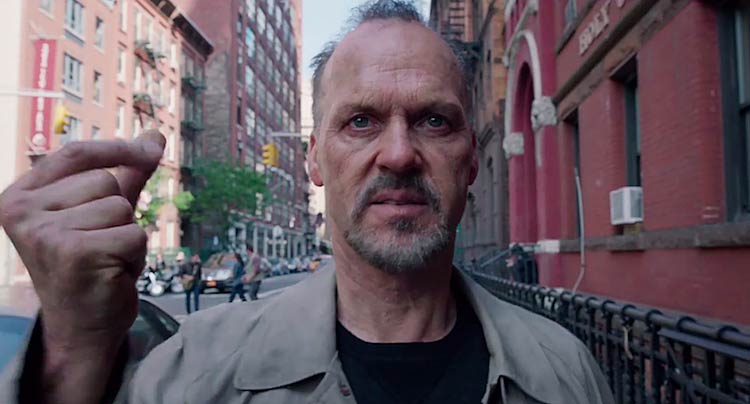The movies are the most self-conscious of the great art forms. From “Citizen Kane” to “Breathless,” “Pulp Fiction” to “Avatar,” filmmakers have brazenly asserted or commented on the very nature of the medium.
The technology has yielded a hybrid art that synthesizes other expressive forms, including photography, painting, literature, theater and dance. The best directors have always intuitively understood the power and sensuality of the cinema and the camera’s ability to record gesture and feeling. The motivating principle is that it moves.
The Telluride Film festival ended late Monday night, and the common experience was one of euphoria. Regardless of your connection to movies—critic, filmmaker, distributor or just serious movie lover—the idealized pleasure of what any festival promises is the opportunity to take in the unknown and be jolted and awakened to new ways of looking and seeing.

Alejandro González Iñárritu’s volcanic and deliriously inventive “Birdman” delivered that and a great deal more. It’s a self-creation myth that captures as well as any of the films being shown here a palpable sense of excitement and pleasure. At the first screening on Saturday night, hundreds were turned away and the festival added a couple of additional screenings on Monday night in order to satisfy the rising demand.
The first American screenings following its celebrated debut at Venice last week. Starring Michael Keaton in a revealing and highly self-critical performance, “Birdman” boldly announces itself with its propulsive filmmaking, the verve of the acting and a subversive engagement in expanding the narrative possibilities of technique and form. The bravura filmmaking is undeniable. I sensed something beyond that, as the extraordinary technological achievements were utilized to explore the nakedly human and emotional implications of the material.
Iñárritu wrote the script with Nicolas Giacobone, Alexander Dinelaris and Armando Bo. “Birdman” is an energetic and frenetic backstage comedy with self-reflexive flourishes of the hallucinatory and baroque that link it with such great films as John Cassavetes’ “Opening Night” and Bob Fosse’s “All that Jazz.”
“Birdman” meditates on a great many themes, the nature of art and creativity, the veneer between ambition and madness, and the capriciousness of fame. It’s absurdist and darkly comic. Cassio’s famous lament, in “Othello,” of a reputation destroyed, “I have lost the immortal part of myself, and what remains is bestial,” sets the wounded and anxious tone.
The action unfolds almost exclusively within the interiors of the St. James Theater on West 44th Street during final previews of a new Broadway play. The autobiographical subtext is that of the film’s lead actor. A fading action star tries to resurrect his career by directing, writing and starring in an ambitious production of Raymond Carver’s “What We Talk About When We Talk about Love.”

The actor Riggan Thomson (Keaton) achieved extraordinary popularity as the winged superhero star of the eponymous action franchise and must now ruminate on his professional irrelevance in the two decades since he refused to continue the role in further sequels. The remnants of the past haunt him, like a poster from the final film in the franchise that lines his dressing room, or more disturbingly, the coolly authoritative and sinuous voice of the character who now mercilessly taunts him.
The casting is crucial, and Iñárritu gets everything here just right. Naomi Watts projects a self-reflexive defensiveness and vulnerability as an actress also making her Broadway debut. Edward Norton draws on his own past, his own circumstances, in his unpredictable, wild turn as Watts’ boyfriend and Hollywood star, who further upends the stressed out emotional dynamics of the production as a late replacement for an injured actor. The British actress Andrea Riseborough completes the tight circle, playing Thomson’s lover, sharply negotiating different extremes, of viper and opportunist, confidante and manipulator.
As Thomson’s daughter turned personal assistant just out of rehab, Emma Stone continues to astonish with her range and ferocity. She’s introduced through a mobile media device trying to find the particular flower her father has requested and immediately she establishes the character’s emotional temperament, the wary entitlement and desperate urge to be respected and feel needed.

The great cinematographer Emmanuel Lubezki is the film’s other star. He has done superb work with Terrence Malick and the Coen Brothers and won the Academy Award last year for Alfonso Cuarón’s “Gravity.” Imagine that movie’s remarkable opening extended for two hours, and that only gets at the complex visual architecture of “Birdman.” Suggesting Aleksandr Sokurov’s “Russian Ark,” Iñárritu and Lubezki deploy complicated and meticulous effects work invisibly, as though it were second hand, in giving the impression the entire work is arranged as an unbroken and continuous take.
Every image in the film just pops. The camera work elevates and floats like Max Ophuls’ elegant work, traversing through the cramped hallways and backrooms organically or transcendently floating into the wings. Rather than alienation the stylization of image, the cumulative power is extraordinary and proves how quickly and naturally the work transforms depending on the exigencies of the moment, like a hilarious and unsettling moment when Norton’s character, all Method, tries to convince Watts’ already besieged actress to have unsimulated sex in order to intensify the dramatic realism during the play’s convulsive final act.
Iñárritu is a great orchestrator, and the pieces just flow together. “Birdman” is a work of many layers, in ferreting out how closely Keaton’s own career parallels that of the character, the volatile interplay of the performers and the desire to reconcile the thrilling technical and formal ideas to a more direct and pure emotional response.
The excitement is also about the talented Iñárritu at last striking the perfect balance of sensibility and technique. After the early promise of his debut, “Amores Perros,” Iñárritu gave way to a lingering sense of being trapped, like Keaton, painting himself into a corner with elliptical, nonlinear stories that felt increasingly closed and mechanically constructed and turned on strained coincidences and psychologically implausible actions.
With a lesser director, “Birdman” would appear too much, like the syncopated and often electrifying jazz drum work of Antonio Sanchez that punctuates most of the film. The film has a lift and tremendous lyric freedom. This feels like a work of the moment, of the kind of freedom, style and energy that only the cinema is capable of. “Birdman” justifies the hype, and reminds why for those four days at the end of summer, Telluride is the greatest place to be.












